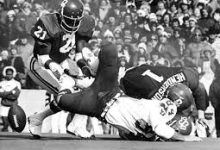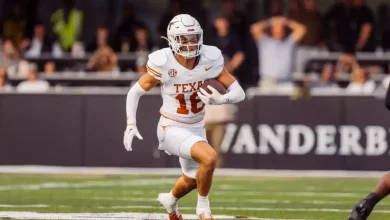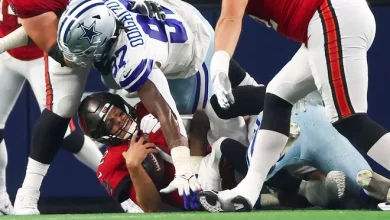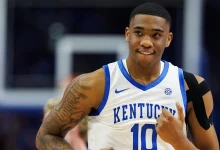Bob Stoops is considered by many to be one of the greatest college football coaches of all time, and best known as the head coach of the University of Oklahoma football team, the Oklahoma Sooners, from 1999 to 2016. During his 18-year tenure as Oklahoma’s head coach, he amassed
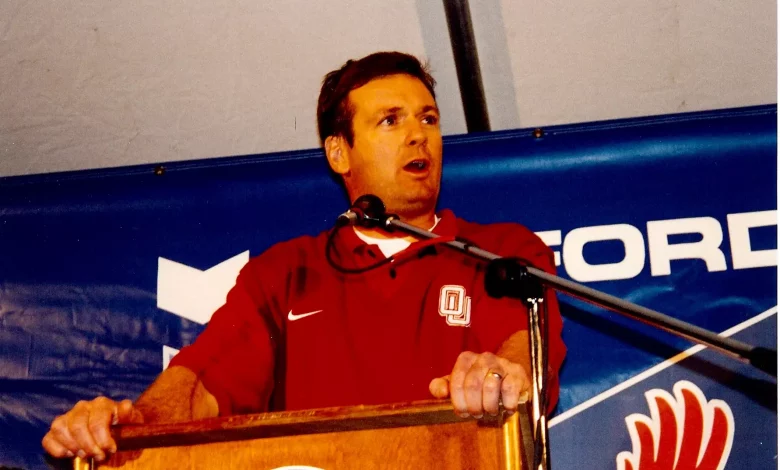
Bob Stoops arrived in Norman, Oklahoma, in December 1998, inheriting a program that had experienced inconsistency in the 1990s. His predecessor’s departure left the Sooners hungry for direction. Stoops, born in Youngstown, Ohio, on September 9, 1960, brought with him a pedigree of coaching wisdom, forged under mentors like Hayden Fry at Iowa, Bill Snyder at Kansas State, and Steve Spurrier at Florida. His youthful energy paired with a disciplined Steel Valley mindset offered a fresh vision for Oklahoma football .
In his debut season (1999), Stoops led the Sooners to a 7–5 record and a bowl appearance—the program’s first postseason berth since 1994. That season laid the groundwork for sustained success. In 2000, his second year, he orchestrated a perfect 13–0 campaign culminating in a 13–2 Orange Bowl victory over defending champion Florida State, securing Oklahoma’s first national title since 1985 . The team began the season ranked #19, but Stoops’s leadership fueled wins over top-tier opponents like Texas, Kansas State, and Nebraska, propelling the Sooners to the top of national polls and igniting a new era of dominance .
The 2000 season also launched the Sooners on a 20-game winning streak extending into 2001—one of the longest in program history . Stoops’s early success earned him the moniker “Big Game Bob.” From 1999 to 2003, his teams posted an 18–2 record against ranked opponents and went 3–1 in bowl games, reinforcing a reputation for thriving under pressure .
Stoops’s bowl-winning resume is unique: he captured victories in all four major BCS bowls—Rose, Orange, Sugar, Fiesta—and the national championship. The Sooners defeated Washington State in the 2003 Rose Bowl, beat Florida State in a second Orange Bowl, claimed the 2014 Sugar Bowl over Alabama, and secured the Fiesta Bowl elsewhere, a rare achievement in college football history .
Historically, Stoops’s Sooners dominated the Big 12 Conference. He led Oklahoma to 10 conference titles during his 18-year tenure—the most in Big 12 history. His teams never had a losing record in conference play, finishing 121–29 (.807) . The Sooners won consecutive titles in the early 2000s and added championships in later years. No other Big 12 program came close to that level of sustained success.
Oklahoma under Stoops thrived at home. Gaylord Family – Oklahoma Memorial Stadium became a fortress; the Sooners lost only nine home games, posting a remarkable 101–9 record and maintaining consistent sellouts throughout his tenure . Nationally, Oklahoma led all Power Five programs in total victories from 2000 to 2016 .
Defense was a hallmark of Stoops’s teams. Since taking over in 1999, the Sooners held opponents to a 31.5% conversion rate on third downs—the second-best rate in FBS during his era . They forced an average of 28.5 turnovers per season and scored 46 defensive touchdowns, fueling game-changing plays week after week . Those defensive performances complemented explosive offenses, which averaged 2.56 points per drive, ranking eighth nationally .
Individual excellence flourished under Stoops. Oklahoma produced two Heisman Trophy winners—quarterbacks Jason White (2003) and Sam Bradford (2008)—both coached by Stoops . He also coached multiple All-Americans and award winners: Rocky Calmus, Josh Heupel, Roy Williams, Adrian Peterson, Jimmal Brown, and others earned national honors, showcasing Stoops’s ability to develop elite talent .
Bob Stoops’s success translated into postseason dominance. He coached in 18 consecutive bowl games—the first coach in Oklahoma history to do so—and compiled a 9–9 bowl record, including high-profile triumphs in Fiesta, Rose, Orange, and Sugar Bowls . Stoops’s teams appeared in four BCS National Championship Games (2000, 2003, 2004, 2008), winning the first and falling short in the later three . His 2015 team reached the inaugural College Football Playoff, underscoring Oklahoma’s continued relevance in the playoff era .
Rivalries were never neglected. Stoops excelled in the Red River Rivalry, compiling an 11–7 record against the Texas Longhorns, including dominant wins such as 63–14 (2000), 65–13 (2003), 55–17 (2011), and 63–21 (2012) . Similarly, against in-state rival Oklahoma State, the Sooners were unstoppable, posting a 14–4 record .
Stoops’s coaching accolades include six Big 12 Coach of the Year awards and two national coach of the year honors . He became the fastest coach in college football history to reach 100 wins, a milestone achieved by his 2008 season . Over 18 seasons, his teams recorded 14 double-digit win seasons—a testament to sustained excellence .
Stoops’s impact extended beyond the field. His arrival ended a period of declining support; Sooners athletics transformed from red ink to record fundraising and infrastructural growth. Increased donations funded renovations, state-of-the-art facilities, and academic support systems—catalyzing Oklahoma’s athletic renaissance .
By June 7, 2017, Stoops stepped down with a staggering 190–48 record (.798), firmly establishing himself as Oklahoma’s all-time winningest coach—outpacing Barry Switzer and Bud Wilkinson . The announcement, coordinated with the promotion of offensive coordinator Lincoln Riley, marked a seamless transition .
Bob Stoops’s legacy is deep and enduring. In 2021, he was inducted into the College Football Hall of Fame—an honor reflecting his transformational leadership and impact . His teams never had a losing season; only four seasons yielded fewer than 10 wins—all overshadowed by consistent excellence .
Stoops’s coaching blueprint combined defense, explosive offense, and situational dominance. His teams ranked second nationally in win percentage vs. AP Top 25 teams during his tenure . He engineered eight home sellouts, five top-five national finishes, and prolonged success through matched recruiting, player development, and tactical innovation .
In just his second season, Stoops won his only national title. But sustained excellence defined his career. From 2000 to 2003, Oklahoma posted a 20-game winning streak, 14-game streak later, and brought home more conference championships than any Big 12 team .
Stoops’s impact extended into playoff and BCS transition eras. His 2015 team reached the College Football Playoff, and the 2014 Sugar Bowl win over reigning national champion Alabama proved his teams could excel in varied systems .
Under Stoops, Oklahoma consistently produced NFL-caliber talent. From Heisman winners to All-Americans, from first-round picks to professional athletes, the pipeline of talent under Stoops is among the top in the sport .
Stoops’s reputation as a coach who delivered in big moments was cemented early. Yet even in later years, he guided victories over top-ranked teams and in major bowl games .
Evaluating the scope of Stoops’s career:
- 190–48 overall record (.798 winning percentage), the most victories in Oklahoma history .
- 10 Big 12 titles, with a 121–29 conference record (.807) .
- 18 consecutive bowl appearances, 9 bowl wins, and victories in all four major BCS bowls .
- One national championship (2000), with three additional title game appearances .
- 6 Big 12 Coach of the Year and 2 national coach of the year honors .
- 2 Heisman Trophy winners, multiple All-Americans, award winners, and NFL draft picks .
- Home dominance: 101–9 record, sellouts, and a 919 home-winning percentage .
- Tactical excellence: defense, third-down stops, turnovers, scoring efficiency .
- Coaching milestones: fastest to 100 wins, 14 double-digit win seasons, never a losing season .
- College Football Hall of Fame induction (2021) .
Bob Stoops’s tenure represents a golden age of Oklahoma football—a time of sustained dominance, record-breaking success, and cultural rebirth. His leadership revived the program’s national relevance, elevated its financial and recruiting status, and established a winning culture still guiding the Sooners today. Many consider him among the greatest coaches in college football history; his time in Norman remains a defining legacy of excellence.


